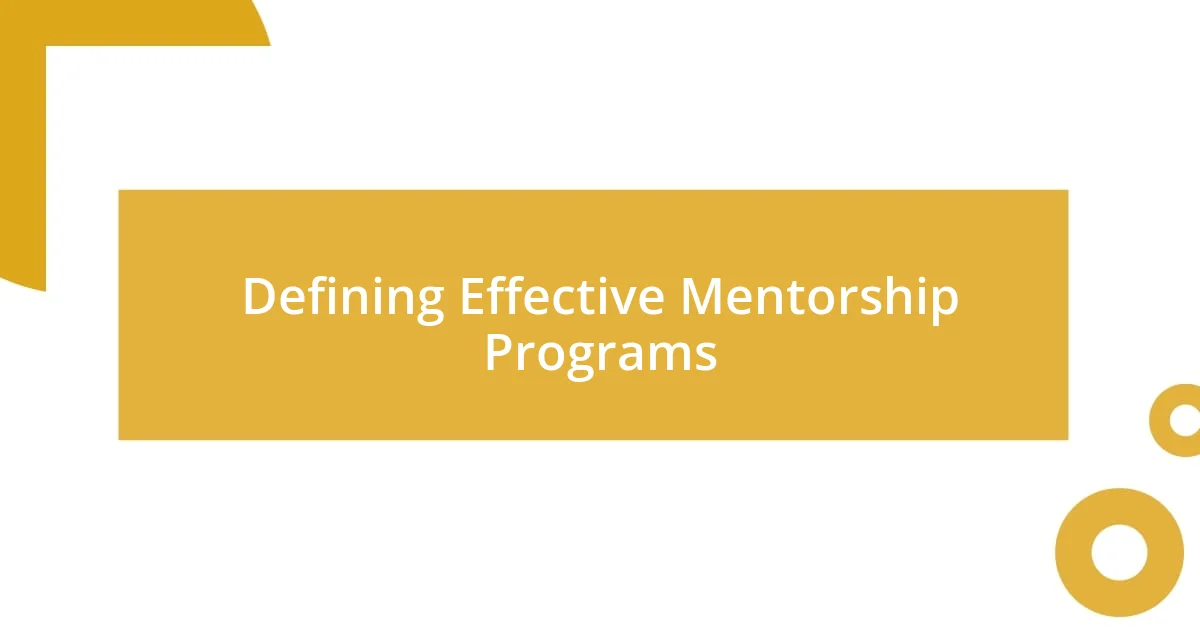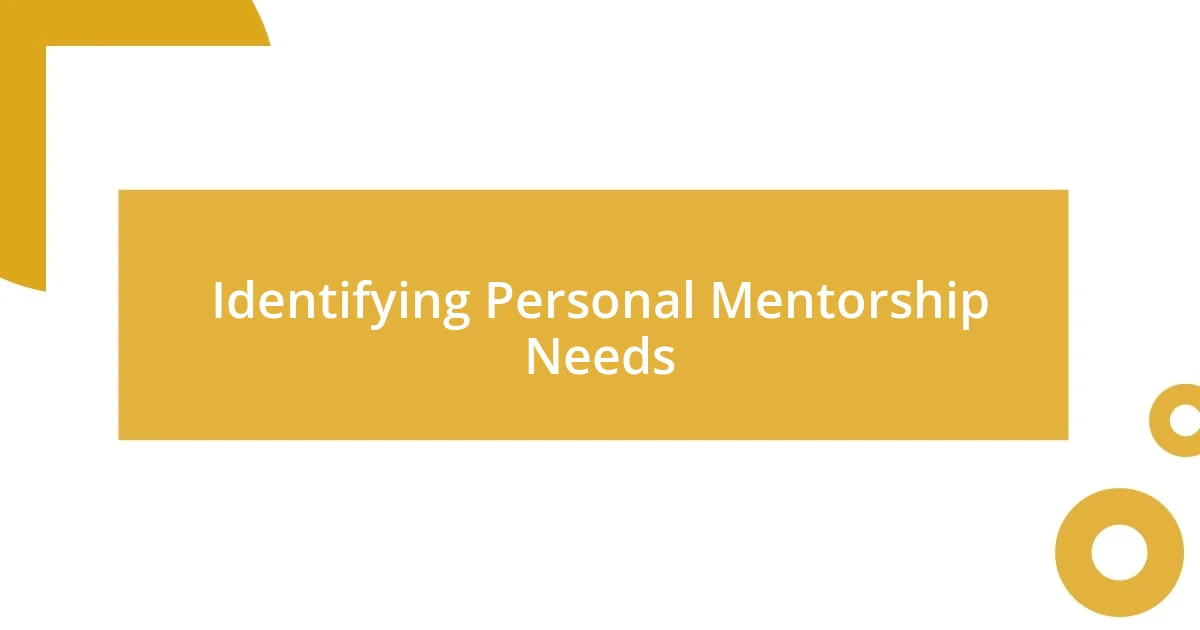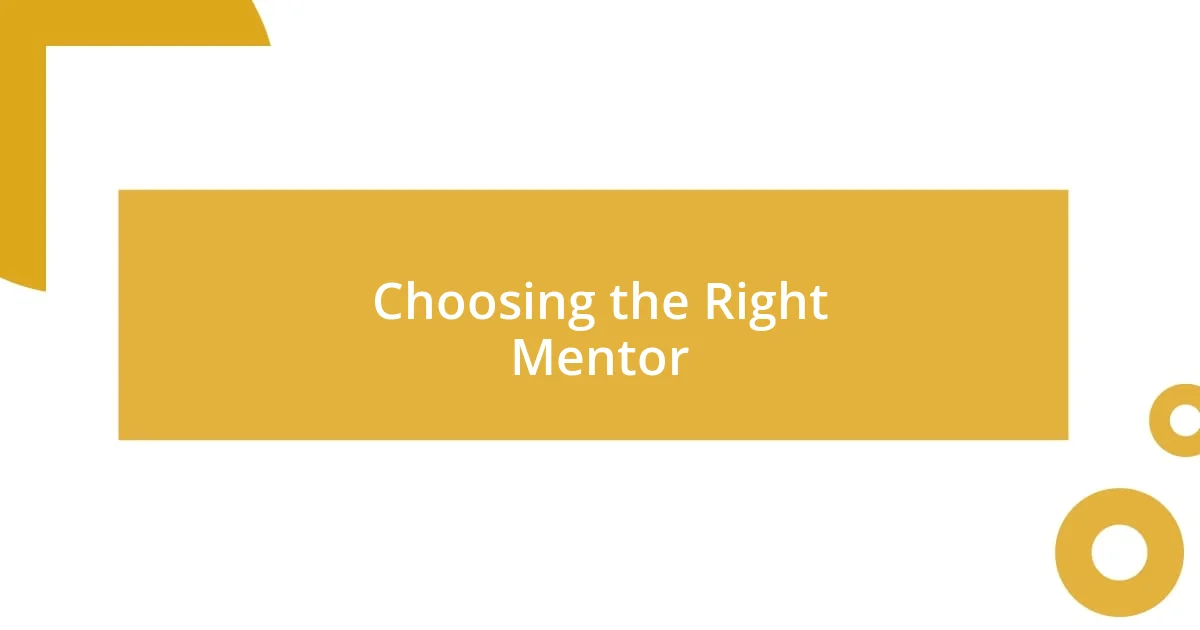Key takeaways:
- Effective mentorship programs hinge on clear objectives and building trust through vulnerability between mentors and mentees.
- Choosing the right mentor involves aligning values, assessing communication styles, and ensuring personal rapport to foster a supportive learning environment.
- Regular feedback and the ability to adjust goals enhance the mentorship experience, allowing for growth through reflection on both successes and setbacks.

Defining Effective Mentorship Programs
Effective mentorship programs are rooted in clear objectives that align with both the mentor’s and mentee’s goals. I remember my first experience in a mentorship program, which almost felt like a scavenger hunt. Each session was about uncovering not just skills, but also personal insights that pushed me to grow. How can we truly measure success if these objectives don’t resonate with the participants?
Another crucial element is the quality of the relationship between the mentor and mentee. It’s not just about guidance but building trust. In my case, a mentor once shared a professional setback that deeply humanized him for me. That moment reinforced the idea that real mentorship thrives in an environment where vulnerability is welcome. Isn’t it fascinating how sharing failures can create a stronger bond?
Moreover, effective mentorship programs provide opportunities for feedback and reflection. A mentor I once had encouraged regular check-ins where we discussed not just progress, but also feelings about the journey. This reflective practice allowed me to adjust my path and stay motivated. What if more programs focused on this aspect? It could transform the mentorship experience from a mere exchange of advice to a genuine exploration of growth.

Identifying Personal Mentorship Needs
When it comes to identifying personal mentorship needs, self-reflection is key. I’ve found that asking myself what I truly want to achieve can clarify my path. During one of my mentoring experiences, I took time to journal my goals, which helped me pinpoint the skills I wanted to develop, such as leadership or communication. I realized that when I defined these needs, my mentor was able to tailor our meetings to focus on exactly what would propel me forward.
To streamline this process, consider these questions:
- What specific skills am I looking to improve?
- Do I seek guidance in my current career or support for a transition?
- How comfortable am I with vulnerability, and how does that impact what I want from a mentor?
- What values do I want in a mentor, like empathy or authority?
- Am I looking for structured advice or more of an open dialogue?
Taking the time to answer these questions can profoundly influence the effectiveness of the mentorship experience.

Choosing the Right Mentor
When deciding on a mentor, I’ve learned the importance of aligning my values and goals with those of my potential mentor. It’s like finding a dance partner; if you don’t share a rhythm, the partnership may falter. For instance, I once chose a mentor based on their impressive resume, but our differing values led to a disconnect that stunted my progress. Have you ever experienced a mismatch like that? It can be disheartening, but it also serves as a valuable lesson in the selection process.
After narrowing down candidates, I recommend having a conversation with potential mentors to gauge compatibility. During my search, I had a coffee chat with someone who initially seemed ideal. However, their communication style was so domineering that I felt stifled, which really helped me realize I needed someone who encouraged dialogue rather than dictated. The right mentor should spark inspiration rather than intimidation, don’t you agree?
Lastly, consider not only professional alignment but also personal rapport. I once mentored someone whose relaxed approach and humor transformed our sessions into enjoyable learning experiences. It became clear that a mentor should not only challenge you but also help you feel comfortable sharing ideas and setbacks. After all, isn’t vulnerability the essence of true growth?
| Aspect | Considerations |
|---|---|
| Values Alignment | Choose a mentor whose values reflect your own for a more profound connection. |
| Communication Style | Evaluate their style—do they listen as much as they speak? |
| Personal Rapport | A good mentor should be someone you feel comfortable sharing with openly. |

Establishing Clear Goals Together
Establishing clear goals together with my mentor has always been a transformative experience. I remember early in my mentorship journey, my mentor and I sat down with a whiteboard and mapped out my objectives for the next six months. It was invigorating to brainstorm openly; we created a visual roadmap that made our sessions feel more structured and purposeful. Have you ever felt that rush of clarity when your goals are laid out right in front of you?
As we delineated our goals, I discovered the beauty of collaboration. We worked on aligning my aspirations with actionable steps, such as enhancing my public speaking skills. This process not only fostered accountability but also gave my mentor insight into my mindset. Their feedback helped refine my goals, transforming them from vague wishes into tangible milestones. How often do we miss out on such clarity by not engaging in this crucial conversation?
Sometimes, I find myself reflecting on how our goal-setting sessions were like planting seeds in a garden. With every discussion, we nurtured a different part of my growth, allowing me to flourish in ways I hadn’t anticipated. I emerged from those meetings with not just specific targets but a renewed sense of motivation. Have you ever experienced that feeling of momentum when you know you’re not alone in your journey? Having goals established together creates a powerful bond that keeps you striving forward.

Fostering Open Communication
Open communication in mentorship is crucial; it’s where the magic of growth happens. I recall a mentoring partnership where we held weekly check-ins, just to share how things were going. Those sessions became a safe space for me to express concerns, share successes, and even voice my fears. It felt liberating—like lifting a weight off my shoulders every time I walked into the conversation. Can you relate to that sense of relief when you’re allowed to speak freely?
I’ve learned that vulnerability plays a significant role in fostering this open dialogue. One time, I hesitated to share an embarrassing mistake I made at work. My mentor encouraged me by sharing their own past blunders, which softened my anxiety. That exchange transformed our relationship into one built on trust and authenticity. Isn’t it fascinating how shared experiences can break down barriers and lead to more profound conversations?
Moreover, encouraging questions can elevate communication to another level. I’ve found that when I ask my mentor open-ended questions, it sparks deeper discussions that uncover insights I never anticipated. For instance, instead of asking, “What should I do?” I started asking, “What helped you overcome similar challenges?” This shift not only broadened my understanding but also equipped me with the tools to tackle obstacles confidently. Have you ever experienced a moment when a single question opened an entire new pathway of thought?

Measuring Progress and Success
Measuring progress and success in a mentorship program is like keeping a score in a game; it gives you a tangible sense of your growth. I remember a specific moment when my mentor and I sat down to review the goals we had set. We used a checklist format, ticking off achievements while discussing areas still needing attention. It was so gratifying to see the progress visually represented. Have you ever felt that rush of accomplishment when you can literally see how far you’ve come?
Tracking progress has taught me the value of reflection. After each milestone, I took time to celebrate successes, no matter how small. One time, I finally delivered a presentation I had worked tirelessly on. The moment I received positive feedback from my mentor felt surreal. I learned that embracing these small wins not only boosted my confidence but also provided fuel for the journey ahead. What small achievements have you celebrated that boosted your confidence?
Success, however, isn’t solely about the end goals; it’s about the lessons learned along the way. I’ve often found that setbacks provide just as much wisdom as achievements. After facing challenges in a project, my mentor helped me analyze what went wrong and how to improve next time. This process of honest evaluation turned obstacles into opportunities for growth. How has a challenge turned into a stepping stone for you in your journey?

Adjusting the Program as Needed
Adjusting a mentorship program as needed can really enhance the experience for both mentors and mentees. I recall a time when I felt stuck. My mentor and I realized that our initial goals were too ambitious, and we paused to recalibrate. This adjustment allowed us to focus on smaller, achievable objectives, making a world of difference in our productivity. Have you ever felt the relief of shifting your focus to something more manageable?
In another mentorship experience, I found that direct feedback was essential in shaping our sessions. There were moments when I felt overwhelmed, and we adjusted our meeting frequency to accommodate my needs. This flexibility made me feel heard and respected. It’s funny how a little tweak, like a simple scheduling change, can foster a sense of support, don’t you think?
Moreover, building in regular feedback loops can guide necessary adjustments. I vividly remember producing a project, and instead of waiting for our next scheduled meeting, I asked my mentor for quick insights via email. Their timely advice helped refine my work significantly. In those moments, I realized the importance of adaptability—not just in the program structure, but in our approach to communication as well. How often do you seek timely feedback to enhance your personal growth?















